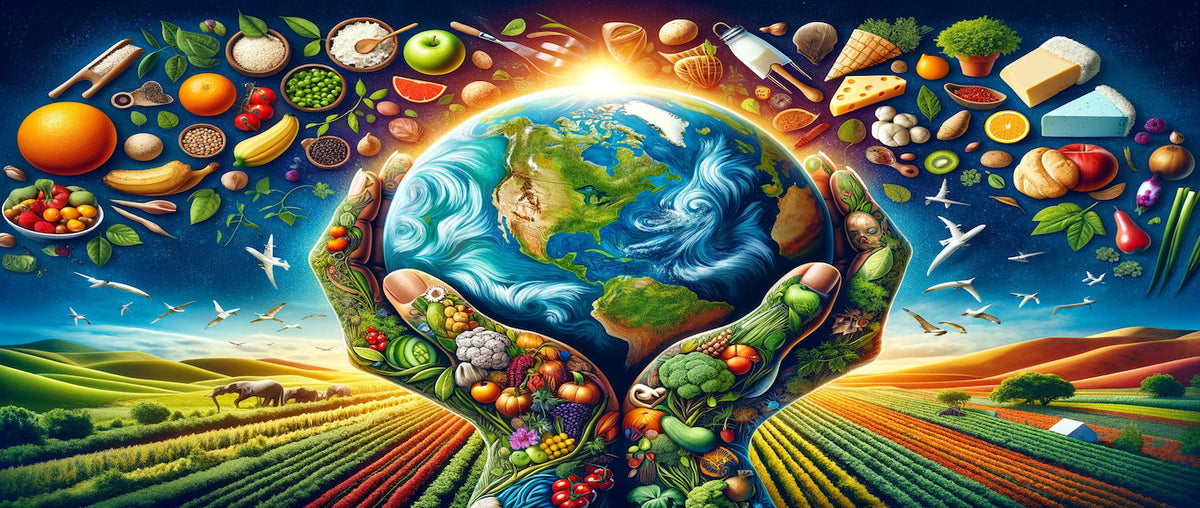Veganism and Biodiversity Conservation
Biodiversity, the rich tapestry of life on our planet, is under unprecedented threat. The choices we make at the dinner table have far-reaching impacts on this biodiversity. Veganism offers a powerful tool in the effort to conserve the planet's biodiversity. It's not just about choosing vegan cheese over traditional dairy or opting for plant-based foods; it's about making choices that support the health of our planet.
Key Takeaways
- Veganism significantly reduces ecological footprints, supporting biodiversity and sustainability.
- Plant-based diets mitigate climate change and promote efficient use of resources.
- Innovations in vegan food enhance accessibility and nutritional diversity.
- Education and policy play vital roles in shifting towards sustainable consumption.
- Ocean conservation is integral to the vegan ethos, emphasizing the importance of protecting marine biodiversity for a balanced ecosystem.
Understanding Biodiversity
Biodiversity encompasses the variety of all biological life - plants, animals, fungi, and microorganisms - and their ecosystems. It's the foundation that supports life, including human life, providing us with oxygen, food, medicinal resources, and much more. Yet, this crucial resource is in jeopardy due to human activities.
The Role of Veganism in Conservation
Adopting a vegan lifestyle means more than enjoying Vegan products like vegan butter and Cashew Butter. It's a commitment to living in a way that minimizes harm to the environment. Plant based diets significantly reduce the demand for resources that lead to deforestation, habitat loss, and species extinction. By choosing vegan food products and cholesterol free foods, we can help reverse the trend of biodiversity loss.
The Environmental Impact of Food Choices
Our food choices have a profound impact on the planet's health. The production of animal-based foods is a leading cause of habitat destruction, water pollution, and greenhouse gas emissions. In contrast, plant based products, including Fat Free Butter and vegan mayo, offer a sustainable alternative with a lower environmental footprint.
Global Meat Consumption and Biodiversity Loss
The demand for meat and dairy products drives deforestation and threatens biodiversity. Livestock farming not only requires vast amounts of land but also leads to the conversion of natural habitats into agricultural land. This not only reduces biodiversity but also contributes to climate change.
Plant-Based Diets: A Sustainable Alternative
Plant based diets are key to preserving our planet's biodiversity. By shifting towards diets rich in plant based cheese, Vegan Shop offerings, and other vegan products, we can reduce the strain on natural resources. Research shows that a global move to a more plant-based diet could free up millions of square kilometers of land, allowing nature to thrive.
The Science Behind Veganism and Ecosystem Health
Agricultural Practices and Land Use:
Modern agriculture has a significant impact on the planet. The shift towards plant based products can drastically reduce this impact. For instance, producing plant based cheese and vegan butter requires less land and water compared to traditional dairy products, contributing to the preservation of natural habitats. This sustainable approach to agriculture can feed more people using less land, which is crucial for protecting ecosystems and the species that inhabit them.
Diet, Climate Change, and Biodiversity:
The link between dietary choices, climate change, and biodiversity cannot be overstated. Vegan food products, by virtue of being cholesterol free foods and often produced with a lower carbon footprint, play a pivotal role in mitigating climate change. This, in turn, supports biodiversity conservation, as stable climates prevent habitat destruction and species extinction. Choosing fat free butter and cashew butter over their animal-based counterparts can significantly reduce one's environmental impact.

Strategies for Promoting Biodiversity Through Diet
Policy and Consumer Behavior:
Governments and policymakers have a critical role in promoting sustainable diets. Implementing policies that encourage the production and consumption of plant-based foods and vegan products can lead to significant environmental benefits. Consumer behavior also drives market trends; as more people opt for vegan cheese, vegan mayo, and other plant-based products, industries will adapt, fostering a market that supports biodiversity.
Education and Awareness:
Raising awareness about the environmental impact of dietary choices is essential. Educating the public about the benefits of veganism and plant-based diets—not just for health but also for the environment—can inspire a shift towards more sustainable eating habits. Highlighting the role of vegan food products in conservation efforts can motivate individuals to make choices that support biodiversity.
Addressing Global Environmental Challenges
Reverse Biodiversity Loss:
Veganism offers a path to reversing biodiversity loss. By reducing the demand for animal agriculture, we lessen the pressure on wild areas prone to deforestation and degradation. Plant based diets preserve natural habitats, allowing ecosystems to recover and thrive.
Living within the Global Carbon Budget for Food:
Adopting a vegan diet aligns with the goal of living within our planet's carbon budget. Vegan products, such as vegan butter and vegan cheese, typically have a lower carbon footprint than animal-based foods, contributing to the reduction of greenhouse gas emissions.
Feed the Planet on Existing Cropland:
The efficient use of existing cropland is crucial for feeding the growing global population. Plant-based foods and vegan products can be produced more sustainably, using fewer resources than required for meat and dairy, demonstrating that it's possible to nourish humanity without expanding agricultural lands.
Also Read
Veganism and Environmental Advocacy
What Does Being Vegan Do for the Environment?
Veganism extends beyond dietary choices; it's a form of environmental advocacy. By opting for vegan cheese, plant-based cheese, and other vegan products, individuals contribute to lower carbon emissions, reduced water usage, and diminished agricultural land needs. This shift helps mitigate climate change, preserve water resources, and protect natural habitats, showcasing the profound environmental benefits of veganism.
Will Veganism Save the Planet?
While no single action can save the planet, veganism represents a significant step towards sustainability. Adopting a vegan diet reduces one's ecological footprint, supports biodiversity conservation, and helps maintain the global carbon budget. It's a powerful choice in the array of actions needed to combat environmental degradation and climate change.
Ocean Conservation: Why It's More Important Than Ever
Ocean conservation is critical in the context of veganism. The oceans play a key role in regulating climate, supporting biodiversity, and providing sustenance. Vegan diets reduce the demand for fish and seafood, alleviating pressure on marine ecosystems. This is crucial for protecting coral reefs, marine species, and ensuring the health of our oceans.
Overcoming Challenges and Looking Forward
Addressing Nutritional Concerns and Myths
One of the challenges of veganism is ensuring a well-balanced diet. It's crucial to debunk myths about protein deficiency and highlight the nutritional benefits of plant-based foods, which can provide all essential nutrients when carefully planned.
The Future of Food: Innovation in Plant-Based Alternatives
The future of food sees a significant shift towards sustainability, with plant-based products leading the way. Innovations in vegan food products, including vegan cheese and plant-based cheese, are not only catering to the growing vegan population but are also appealing to mainstream consumers, showcasing the versatility and environmental benefits of plant-based eating.
Conclusion
The journey towards biodiversity conservation and environmental sustainability is complex and multifaceted. Veganism, with its profound implications for reducing our ecological footprint, offers a path forward. By choosing vegan products and supporting plant-based diets, we contribute to a sustainable future, where cholesterol-free foods and vegan food products play a crucial role in conserving our planet's precious biodiversity.
Embracing veganism is more than a dietary choice; it's a commitment to living in harmony with our environment and making choices that benefit our planet and all its inhabitants. As we continue to innovate and educate, the vision of a sustainable, plant-based future becomes increasingly attainable.
By advocating for veganism and ocean conservation, supporting plant-based foods, and promoting policies that favor sustainable agriculture, we can safeguard our planet for future generations. The time for action is now, and every step towards a vegan lifestyle is a step towards a more sustainable and just world.
Craving a delicious vegan meal? Look no further! We've got a guide to the best vegan restaurants in India, ready to help you discover amazing plant-based eats in your city.










